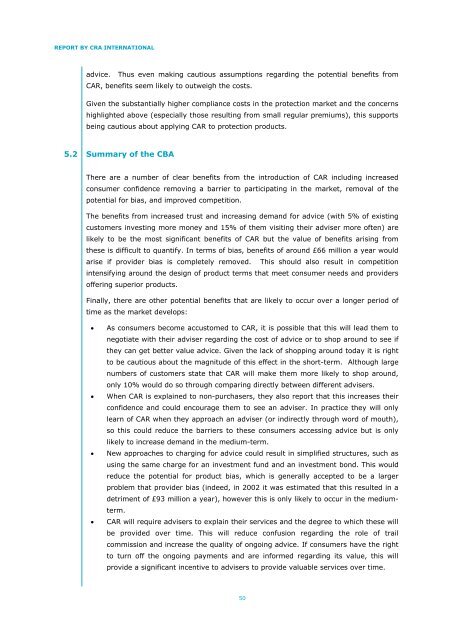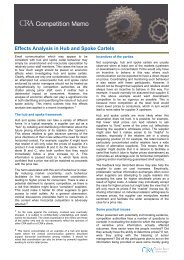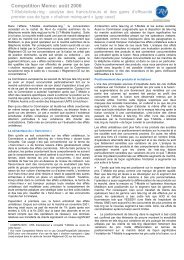CUSTOMER AGREED REMUNERATION - CRA International
CUSTOMER AGREED REMUNERATION - CRA International
CUSTOMER AGREED REMUNERATION - CRA International
Create successful ePaper yourself
Turn your PDF publications into a flip-book with our unique Google optimized e-Paper software.
REPORT BY <strong>CRA</strong> INTERNATIONAL<br />
advice. Thus even making cautious assumptions regarding the potential benefits from<br />
CAR, benefits seem likely to outweigh the costs.<br />
Given the substantially higher compliance costs in the protection market and the concerns<br />
highlighted above (especially those resulting from small regular premiums), this supports<br />
being cautious about applying CAR to protection products.<br />
5.2 Summary of the CBA<br />
There are a number of clear benefits from the introduction of CAR including increased<br />
consumer confidence removing a barrier to participating in the market, removal of the<br />
potential for bias, and improved competition.<br />
The benefits from increased trust and increasing demand for advice (with 5% of existing<br />
customers investing more money and 15% of them visiting their adviser more often) are<br />
likely to be the most significant benefits of CAR but the value of benefits arising from<br />
these is difficult to quantify. In terms of bias, benefits of around £66 million a year would<br />
arise if provider bias is completely removed. This should also result in competition<br />
intensifying around the design of product terms that meet consumer needs and providers<br />
offering superior products.<br />
Finally, there are other potential benefits that are likely to occur over a longer period of<br />
time as the market develops:<br />
• As consumers become accustomed to CAR, it is possible that this will lead them to<br />
negotiate with their adviser regarding the cost of advice or to shop around to see if<br />
they can get better value advice. Given the lack of shopping around today it is right<br />
to be cautious about the magnitude of this effect in the short-term. Although large<br />
numbers of customers state that CAR will make them more likely to shop around,<br />
only 10% would do so through comparing directly between different advisers.<br />
• When CAR is explained to non-purchasers, they also report that this increases their<br />
confidence and could encourage them to see an adviser. In practice they will only<br />
learn of CAR when they approach an adviser (or indirectly through word of mouth),<br />
so this could reduce the barriers to these consumers accessing advice but is only<br />
likely to increase demand in the medium-term.<br />
• New approaches to charging for advice could result in simplified structures, such as<br />
using the same charge for an investment fund and an investment bond. This would<br />
reduce the potential for product bias, which is generally accepted to be a larger<br />
problem that provider bias (indeed, in 2002 it was estimated that this resulted in a<br />
detriment of £93 million a year), however this is only likely to occur in the medium-<br />
term.<br />
• CAR will require advisers to explain their services and the degree to which these will<br />
be provided over time. This will reduce confusion regarding the role of trail<br />
commission and increase the quality of ongoing advice. If consumers have the right<br />
to turn off the ongoing payments and are informed regarding its value, this will<br />
provide a significant incentive to advisers to provide valuable services over time.<br />
50




